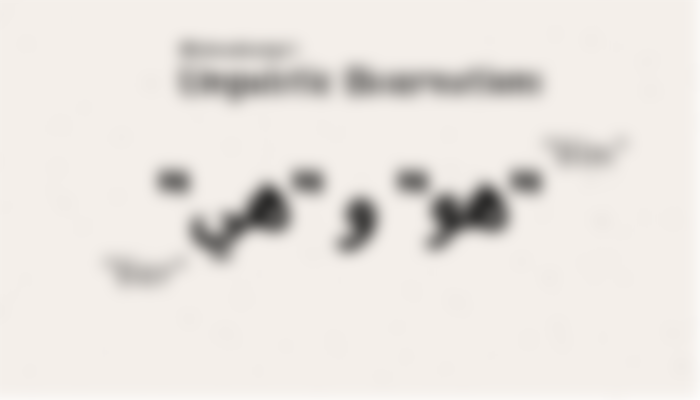Linguistic Observations [Ar/Ly/En]: هو وهي (About Gendered Pronouns)
The other day I was thinking about genders and pronouns... It seems using the correct pronoun while speaking with people is more important nowadays than ever. People get angry when you refer to them with the wrong pronoun. But it's hard to know which pronoun to use when you're speaking text-only online...

Imagine talking to with friends online. You want to tell them about the new guy "hat3myl1fe," you talk about him for a while until he pops up saying "Stop referring to me with 'he!' I'm a girl!" ...I'm sure a lot of us have faced this embarrasment.
In English, when you're not sure of someone's gender, you can use the singular "they" to refer to "them." That's not the case in Arabic. You have to use one of the two options.
In Arabic, every word is considered either masculine or feminine. That doesn't go for just pronouns but every word. Some words have masculine and feminine versions but some words don't.
The words for Moon "قمر" and for Book "كتاب" are masculine words, while the words for Sun "شمس" and for Paper "ورقة" are feminine. Even Arabic speakers have difficulty deciding if some of the words are feminine or masculine and most people only know which is which by common usage.
You might ask: If we don't have the neutral "they?" How does the Arabic language deal with ambiguous situations? It's by using the masculine version!
The masculine version of words and pronouns is also gender-neutral.
It's correct to refer to a woman with a masculine pronoun in the Arabic language, but it's incorrect to refer to a man with a feminine pronoun. In fact, only when a group of people is compromised of 100% females, you can use the pronouns "هنّ/أنتنّ" (feminine them/you) to refer to them. If there is a single male in the group you'll have to use the masculine version "هم/أنتم " to refer to that group.
Still, even if it's correct it doesn't save you from offending people! People take their genders very seriously, so I don't blame a girl if she lashed out if I called her with the masculine pronoun.
To not sound too pessimistic, most people I met who use gender-neutral usernames online are forgiving when I made a mistake, both in Arabic communities and English ones. Internet is full of negativity, but I'm lucky to have been in many welcoming communities, this Readcash community included!
So, what do you think?
Did you have a similar experience? What do you think about genders and pronouns? Have you experienced a scenario like the "hat3myl1fe" one I wrote above? I look forward to your comments!
This article is also on Hive's Peakd.

Seriously it's one problem I also face with people. Most don't know whether my real name is feminine or masculine and they almost always refer to me as a male. It's embarrassing I can't forget once I was to collect a gift in public, the announcer called my name and attached "brother" to it. Well, he later apologized. So, most times I don't use my real name to avoid the he/she ambiguity.